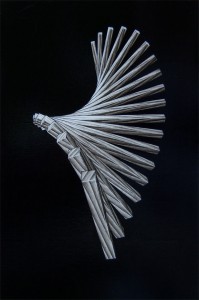So many wonderful poems about Icarus–probably my two favorites are Jack Gilbert’s Failing and Flying and Auden’s Musee des Beaux Arts. I love Muriel Rukeyser’s Waiting for Icarus too. This one by Robert Cording (from Poetry Daily) adds something new to the assemblage. It takes flight from a stark opening:
Icarus
After our son died, my wife found him
in coincidences—sightings of hawks, mostly,
at the oddest of times and places, and then
in a pair of redtails that took up residence,
nesting in a larch above our barn, and how
their low, frequent sweeps just a few feet above us
before rising over our kitchen roof
made it seem as if they were looking in on us.
In a way, it all made sense, our son so at home
in high places—the edges of mountain trails,
walking on a roof, or later, after he became
a house painter, at the top of a forty-foot ladder.
So many mornings we woke to the redtails’
jolting screeches and, even if I was a casual believer,
their presence multiplied my love
for the ordinary more every day. We never thought,
of course, any of those hawks was our son—
who would ever want that?—but, once,
watching one rise and rise on a draft of air,
I thought of Icarus soaring toward the sun—
as if an old story could provide the distance
I needed—waxed and feathered, his arms winged,
and remembered a babysitter’s frantic call
to come home, immediately, after she’d found
our ten-year-old nearly forty feet up
in an oak tree. I can almost hear him again, laughing
high up in the sky, throned on a branch,
his feet dangling, knowing nothing but the promise
of heights as he waved to me—
and I must have looked very small
calling up to him, staying calm
so falsely as I pleaded with him
to come down, to come down now.




